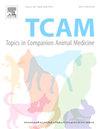Reporting perceived capability, motivations, and barriers to reducing treat feeding amongst dog and cat caregivers
Abstract
Obesity remains a significant concern for dogs and cats, and reducing or eliminating treats is commonly recommended as a strategy for weight management. Caregivers can struggle with adherence to such dietary recommendations. Previous research suggests caregivers are reluctant to reduce treats but there is limited understanding of the underlying factors contributing to these behaviours and decisions. The objective of this study was to explore caregivers’ motivations and barriers to reducing treat feeding, and their reported capability to do so. An online questionnaire including multiple choice and Likert scale questions was disseminated to dog and cat caregivers (n=1053) primarily from Canada and the USA from September to November 2021. Caregivers commonly expressed a wide range of motivations to reduce treat feeding with their pet, though barriers to reducing treat feeding were less defined. Changing their pet's routine was a reported barrier by more than 30% of respondents and was predictive of caregivers finding reducing treat giving to be difficult (OR=1.67, p=0.017). Results from multivariable logistic regression also revealed that caregivers who consider their companion animal to be obese as more likely to perceive reducing treats to be difficult. The results highlight the role of treats in the relationship and routine of caregivers’ and their pets, and the importance of considering the individualised needs and circumstance of the caregiver and pet in veterinary discussions surrounding reducing treat feeding. Identifying these perspectives can improve self-efficacy with veterinary nutrition recommendations surrounding treats.

 求助内容:
求助内容: 应助结果提醒方式:
应助结果提醒方式:


